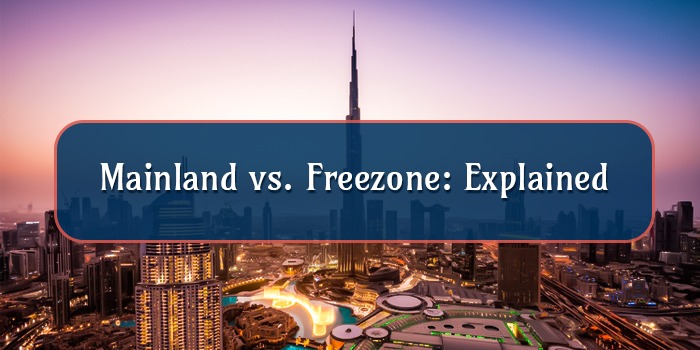A common inquiry many prospective customers make is what is the benefit of opening a company in a free zone? What is the difference between a mainland company and a free zone company? For any foreign investor or expat who wishes to start a business in the UAE this a very crucial question.
UAE offers potential entrepreneurs three major jurisdictions to open their business: Mainland or Onshore, Freezone, and Offshore. Each of these jurisdictions has its own pros, cons, and set of criteria to be satisfied. Understanding the difference between each of these and then choosing the right choice that perfectly suits the business operations and goals is very important.
Mainland Company:
This simply means an onshore company registered with the relevant emirate’s government authority. A trade license will be issued by the Emirate’s Department of Economic Development (DED). A UAE mainland company enjoys restrictionless trading or commercial activity. It can carry out its operations anywhere inside as well as outside UAE.
Freezone Company:
Free zones are normally characterized by 100% ownership and tax concessions. The first free zone in the UAE opened in the 1980s and at present, there are over 45 free zones across the country. Every free zone is managed and administered by its own regulatory authority called the Free Zone Authority. Each of these has its own laws and regulations in every aspect.
The Difference
Ownership: Until recently, a foreign investor forming a company in the mainland was allowed only to own a maximum of 49%, while the remaining 51% had to go to the Emirati sponsor. However, the UAE government now allows 100% foreign ownership for companies registered in the mainland. Free zones have no such restrictions as the foreign investor can enjoy complete ownership from day one. Allotting shares to a local sponsor is not required.
Business scope: As a fundamental difference free zone companies cannot do business outside the free zone without the help of a local agent. This restriction does not apply to mainland companies who are permitted to operate everywhere within the UAE market.
Office space: A mainland company must have a minimum of 200sqft of physical office space to be registered. It is not mandatory for free zone companies to ensure a physical location as many free zones allow companies to have virtual workplaces.
Visas: Mainland companies do not have any visa restrictions; however, the number of visas issued is dependent on the workspace area. Obtaining additional visas require acquiring or renting a larger office space. Unlike mainland companies, free zone companies do have restrictions on the number of visas they can apply for. Typically, the number of visas available depends on the free zone regulations, and normally this range from 1 to 6.
Incorporation/Business Set up approvals: You will require several government clearances for a mainland company. These include the Department of Economic Development, the Municipality of Dubai, the Ministry of Labor, etc. In comparison, each free zone has its own laws and regulations for companies formed in its jurisdiction. Approvals from various government bodies and agencies are not a requirement for free zone company setup.
Company audit: It is mandatory for all mainland companies to carry out a financial audit at the end of each fiscal year. However, not all free zones require companies to perform their yearly financial audits. There are free zones that have mandatory audit requirements and those which do not require them at all. This depends on the relevant regulation of each free zone.
Thus having a clear understanding of the major differences between a mainland and a free zone company, you can now take an informed decision about where your business should be set up. At Elevate, we assist investors and entrepreneurs set up the business of their dreams both on the mainland, and free zone. To know more about the company setup, the detailed cost, and the process, feel free to contact us.
Also, visit Offshore company formation to know more about it.

